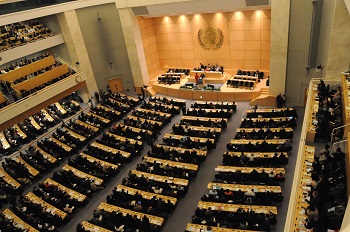Student Delegation from Kennesaw State University Visits the United Nations in Geneva
 27 May 2015, Geneva, Switzerland - A delegation of students from Kennesaw State University (KSU) visited Geneva on 27 May 2015 to learn first-hand about the work of the United Nations on the international stage and visit the historical Palais des Nations. Organized by CIFAL Atlanta, one of UNITAR’s affiliated 14 training centres, the delegation was composed of students of diverse fields of study who shared a common interest in the relationships between countries through diplomacy, business and education.
27 May 2015, Geneva, Switzerland - A delegation of students from Kennesaw State University (KSU) visited Geneva on 27 May 2015 to learn first-hand about the work of the United Nations on the international stage and visit the historical Palais des Nations. Organized by CIFAL Atlanta, one of UNITAR’s affiliated 14 training centres, the delegation was composed of students of diverse fields of study who shared a common interest in the relationships between countries through diplomacy, business and education.
Geneva was the final stop in the delegation’s three-week study visit in Francophone Europe. During their time in Europe, the students in the delegation were introduced to the major characteristics of the globalized and interconnected world in order to help them navigate future international engagement opportunities in their personal, academic and professional lives. They travelled to nine European cities – including Paris, Avignon, Nice, Monte-Carlo and Geneva – across three different countries (France, Monaco and Switzerland) over a period of 16 days. The trip included participation in a wide-variety of unique cultural immersion activities in each city and excursion location, highlighting the unique aspects of each location.
While in Geneva, the delegation visited the Palais des Nations on the occasion of the World Health Assembly and received briefings on the Post-2015 Development Framework and the Sustainable Development Goals process. The delegation also participated in briefings on the United Nations and on UNITAR. Mr. Alex Mejia of UNITAR’s Decentralized Cooperation Programme (DCP) and Mr. Chris Young of CIFAL Atlanta encouraged the students to continue to think critically about the global issues of our time as they prepare for careers in the fields of international relations, business and education.
Photo: The World Health Assembly, General Assembly Hall at the Palais des Nations, the European Headquarter of the United Nations.
Photo credit: WHO/Oliver O'Hanlon

